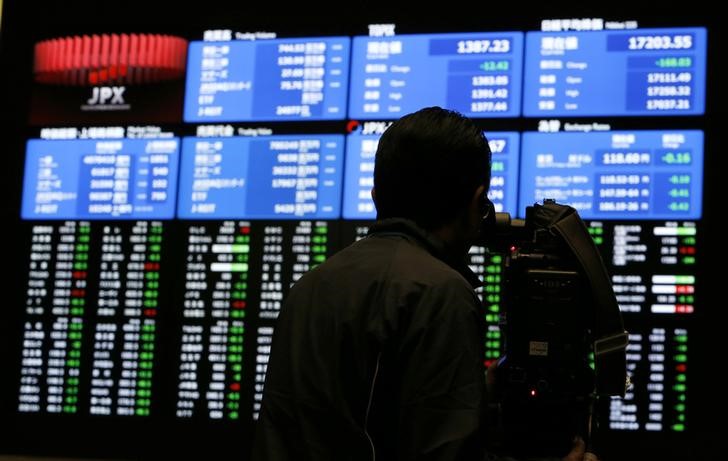By Lionel Laurent
LONDON (Reuters) - European shares held close to a seven-year high on Wednesday and Asian shares hit a six-week peak investors bet the European Central Bank would unveil a stimulus drive to boost the flagging euro zone economy.
Expectations that the ECB will announce a sovereign bond-buying program this Thursday - with the potential size seen at around 600 billion euros ($690 billion), according to a Reuters poll - also kept euro zone core bond yields near record lows and the euro close to an 11-year trough.
The Japanese yen meanwhile rose by around 1 percent against the U.S. dollar <USD/JPY> after the Bank of Japan left policy unchanged. While the decision not to expand its stimulus package had been widely expected, some had also bet on a surprise move as inflation targets looked elusive.
The pan-European FTSEurofirst 300 (FTEU3) equity index was broadly flat, at 1,422.51 points, at 0832 GMT, in line with the MSCI World Index (MIWO00000PUS). MSCI's broadest index of Asia-Pacific shares outside Japan (MIAPJ0000PUS) rose 1.4 percent.
Company trading updates from brewer SABMiller (L:SAB) and semiconductor equipment-maker ASML (AS:ASML) got a positive reaction, with shares of SAB up 2.2 percent and ASML up 4.7 percent. A weaker euro and recent slide in oil are seen boosting most euro zone firms' earnings this year.
Traders, however, also pointed to ripples of nervousness ahead of the ECB's meeting, given the risk of disappointment if the ECB did not meet market expectations.
"A sizeable percentage of the market is factoring in some sort of quantitative-easing announcement, so there's a touch of trepidation," said Alistair McCaig, analyst at IG. "Investors have bought the rumor so they could sell the news."
ECB Governing Council member Ewald Nowotny told a Euromoney conference in Vienna that the central bank's Thursday meeting would be interesting but one "shouldn't get over-excited about it".
Bets on euro zone monetary stimulus also spread through the commodities markets, with gold climbing above $1,300 an ounce for the first time since August. The prospects of looming deflation and increased market volatility were cited as factors supporting demand for bullion.
Sterling fell to the day's low against the euro and the dollar after the minutes of British central bankers' last policy meeting showed a rate rise was less likely.
Two policymakers dropped their call for higher rates in the face of tumbling inflation.
Oil prices edged up, with Brent crude holding above $48.50, in the wake of a recent heavy sell-off in oil that led Total's (PA:TOTF) chief executive to say the French energy major plans to cut capital spending by 10 percent this year.
Slightly firmer energy prices were not enough to stop the Russian rouble falling further on Wednesday, however, with the currency down 1 percent against the dollar as fighting intensified in eastern Ukraine.

($1 = 0.8653 euros)